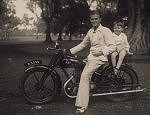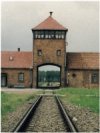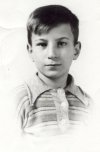
A 7th Grade History Project
|
During our unit on the Holocaust, students have been thinking and writing about issues related to the events and experiences of those who lived and died during this period in history. Students have kept a running journal in their notebooks on the following topics: Entry 1:
What Do You Know?
Students looked at a poster from the United States Holocaust Memorial Museum entitled "Lost Childhoods" containing images of children who were killed during the Holocaust. The images contained studio portraits, family snapshots, and school class pictures of children and families from the 1920s and 1930s in Eastern Europe. Questions included: A) Why do adults save pictures of children?
Students listened to a song by the Indigo Girls called "This Train
Revised." The song described the loss of identity and potential represented
by the deaths of the many types of people arrested, departed, and killed by the
Nazis. Students were asked to reflect on the themes and images contained in the
song.
Students viewed a video entitled "Daniel's Story," which was a composite of the experience a child in nazi-occupied Europe. Students were asked to respond to one or more of these questions: A) How did Daniel cope when he was discriminated against by the Nazis?
Students should reflect on the important theses of the Holocaust unit. After creating a class list, have the students write one or two paragraphs that describe: 1) what important lessons can the Holocaust teach us in today's world. |




